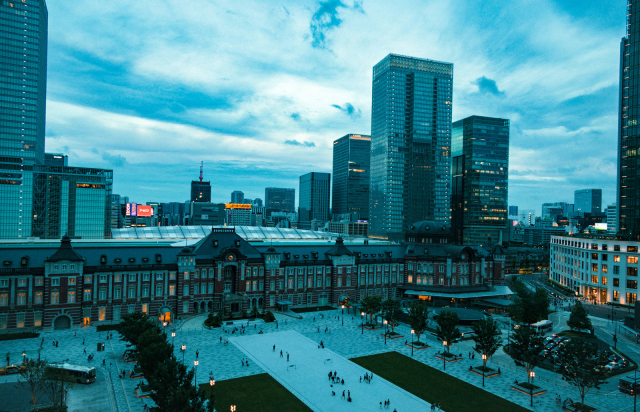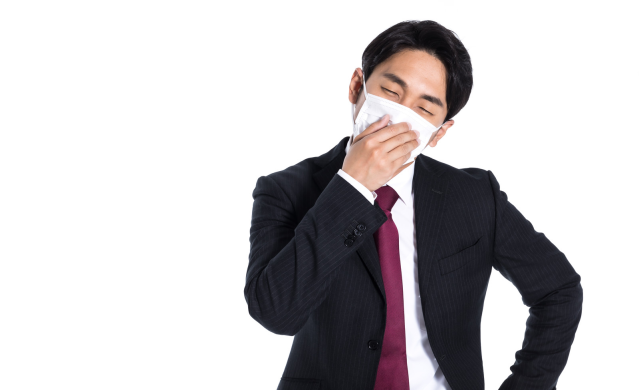
Life has stayed remarkably normal in Japan’s capital during the coronavirus outbreak, but that could be changing soon.
While the coronavirus outbreak remains at the forefront of most people’s thought in Japan, in many ways daily life hasn’t been altered anywhere near as dramatically as it has in many other countries, Yes, sports and entertainment events have been cancelled (with even the Olympics now on shaky footing), and an unprecedented number of Japanese workers are being allowed to telecommute instead of riding crowded commuter trains to their downtown office skyscrapers.
The vast majority of shops are still open, though, not just those providing food, medicine, and other essential items. Restaurants and bars are also still open too and offering eat-in service, though the crowds are noticeably smaller than they would be under standard circumstances. And while large-scale public social gatherings, including cherry blossom viewing parties, are being strongly discouraged, they’re still legally allowed.
The relatively high level of normalcy might be short-lived in Japan’s capital, however. In a press conference on Monday, Tokyo Governor Yuriko Koike said that “The next three weeks will be a critical juncture” in determining whether or not existing countermeasures to limit the spread of the virus are being effective enough. Ominously, that’s the same thing health officials were saying three weeks ago, which suggests that the situation hasn’t improved as much as they’d hoped since late February.
There’s also a new wrinkle to the repeated warning. “Depending on how the situation develops,” Koike said, “the city of Tokyo may have to take more forceful measures, such as being barricaded in what would be called a lockdown.”
The governor’s press conference came one day after the deaths of two passengers who were among those quarantined on the Diamond Princess cruise ship, which was docked in Yokohama harbor for several weeks after cases of coronavirus infection were found among those onboard. The deceased were both Japanese men in their 70s. During her speech, Koike also said that there has been an unexpectedly high number of cases of Japanese citizens returning to the country after contracting the virus abroad, and that she will be reviewing the health inspection process at Tokyo’s Haneda Airport, one of the largest international flight entry points to the country.
Sources: TBS News via Yahoo! Japan News via Jin, NHK News Web (1, 2)
Top image: Pakutaso
Insert image: Pakutaso
● Want to hear about SoraNews24’s latest articles as soon as they’re published? Follow us on Facebook and Twitter!


 Tokyo Governor holds press conference on coronavirus, sparks immediate panic-buying
Tokyo Governor holds press conference on coronavirus, sparks immediate panic-buying Tokyo’s iconic Shibuya 109 building closes temporarily to prevent spread of coronavirus
Tokyo’s iconic Shibuya 109 building closes temporarily to prevent spread of coronavirus How to kill your temptation to go outside this weekend with one piece of paper and some tape
How to kill your temptation to go outside this weekend with one piece of paper and some tape Harajuku looks eerily quiet during the coronavirus outbreak 【Photos】
Harajuku looks eerily quiet during the coronavirus outbreak 【Photos】 Did the Governor of Tokyo just cosplay as Buzz Lightyear to talk about coronavirus?
Did the Governor of Tokyo just cosplay as Buzz Lightyear to talk about coronavirus? Starbucks Japan releases new drinkware and goods for Valentine’s Day
Starbucks Japan releases new drinkware and goods for Valentine’s Day Majority of Japanese women in survey regret marrying their husband, but that’s only half the story
Majority of Japanese women in survey regret marrying their husband, but that’s only half the story Mister Donut and Godiva continue their sweet sweets relationship with new treats on sale now in Japan
Mister Donut and Godiva continue their sweet sweets relationship with new treats on sale now in Japan Totoro cream puffs and Catbus cookies are finally available in downtown Tokyo
Totoro cream puffs and Catbus cookies are finally available in downtown Tokyo The 8 least crowded weekends and holidays at Tokyo Disneyland and DisneySea
The 8 least crowded weekends and holidays at Tokyo Disneyland and DisneySea We try to collect all 7 limited edition Pokémon figurines from Yoshinoya’s Pokémon beef bowl sets
We try to collect all 7 limited edition Pokémon figurines from Yoshinoya’s Pokémon beef bowl sets The best cosplayers from Day Two of the Ikebukuro Halloween Cosplay Festival
The best cosplayers from Day Two of the Ikebukuro Halloween Cosplay Festival Pizza Hut x Tamagotchi collaboration features first-ever pink-dough pizza
Pizza Hut x Tamagotchi collaboration features first-ever pink-dough pizza Is China’s don’t-go-to-Japan warning affecting tourist crowds in Tokyo’s Asakusa neighborhood?
Is China’s don’t-go-to-Japan warning affecting tourist crowds in Tokyo’s Asakusa neighborhood? Japan’s kid-friendly ski program is now selling Pikachu snowboards for a limited time only
Japan’s kid-friendly ski program is now selling Pikachu snowboards for a limited time only Starbucks Japan releases new Frappuccino and latte for Valentine’s Day
Starbucks Japan releases new Frappuccino and latte for Valentine’s Day Our 52-year-old pole dancing reporter shares his tips for achieving your New Year’s exercise goal
Our 52-year-old pole dancing reporter shares his tips for achieving your New Year’s exercise goal 10 times to avoid traveling in Japan in 2026
10 times to avoid traveling in Japan in 2026 Ramen restaurant’s English menu prices are nearly double its Japanese ones, denies discriminating
Ramen restaurant’s English menu prices are nearly double its Japanese ones, denies discriminating Princess Mononoke magnets return just in time to treat yourself to awesome anime decorations
Princess Mononoke magnets return just in time to treat yourself to awesome anime decorations Giant hotel rooms in Osaka reflect the new non-niche face of travel in Japan.
Giant hotel rooms in Osaka reflect the new non-niche face of travel in Japan. Japanese women showing rebounding interest in giving Valentine’s Day chocolate【Survey】
Japanese women showing rebounding interest in giving Valentine’s Day chocolate【Survey】 Umamusume anime girl plushie recalled for having parts she absolutely should not have【Pics】
Umamusume anime girl plushie recalled for having parts she absolutely should not have【Pics】 What’s inside Starbucks Japan’s fukubukuro lucky bag for 2026?
What’s inside Starbucks Japan’s fukubukuro lucky bag for 2026? Starbucks Japan ready to get Year of the Horse started with adorable drinkware and plushies【Pics】
Starbucks Japan ready to get Year of the Horse started with adorable drinkware and plushies【Pics】 7-Eleven Japan starts new temporary luggage storage service in over 300 branches
7-Eleven Japan starts new temporary luggage storage service in over 300 branches Disillusionment at Tsukiji’s tourist-target prices led us to a great ramen restaurant in Tokyo
Disillusionment at Tsukiji’s tourist-target prices led us to a great ramen restaurant in Tokyo Starbucks teams up with 166-year-old Kyoto doll maker for Year of the Horse decorations【Photos】
Starbucks teams up with 166-year-old Kyoto doll maker for Year of the Horse decorations【Photos】 Tokyo’s Tsukiji sushi neighborhood asks tour groups to stay away for the rest of the month
Tokyo’s Tsukiji sushi neighborhood asks tour groups to stay away for the rest of the month Survey asks foreign tourists what bothered them in Japan, more than half gave same answer
Survey asks foreign tourists what bothered them in Japan, more than half gave same answer Japan’s human washing machines will go on sale to general public, demos to be held in Tokyo
Japan’s human washing machines will go on sale to general public, demos to be held in Tokyo We deeply regret going into this tunnel on our walk in the mountains of Japan
We deeply regret going into this tunnel on our walk in the mountains of Japan Studio Ghibli releases Kodama forest spirits from Princess Mononoke to light up your home
Studio Ghibli releases Kodama forest spirits from Princess Mononoke to light up your home Major Japanese hotel chain says reservations via overseas booking sites may not be valid
Major Japanese hotel chain says reservations via overseas booking sites may not be valid Put sesame oil in your coffee? Japanese maker says it’s the best way to start your day【Taste test】
Put sesame oil in your coffee? Japanese maker says it’s the best way to start your day【Taste test】 No more using real katana for tourism activities, Japan’s National Police Agency says
No more using real katana for tourism activities, Japan’s National Police Agency says Starbucks Japan reveals new sakura drinkware collection, inspired by evening cherry blossoms
Starbucks Japan reveals new sakura drinkware collection, inspired by evening cherry blossoms Updated cherry blossom forecast shows extra-long sakura season for Japan this year
Updated cherry blossom forecast shows extra-long sakura season for Japan this year Japanese Prime Minister Shinzo Abe proposes postponing Tokyo Olympics for up to one year
Japanese Prime Minister Shinzo Abe proposes postponing Tokyo Olympics for up to one year Tokyo goes dark as Governor asks for lights out in the city to help fight pandemic 【Pics, Videos】
Tokyo goes dark as Governor asks for lights out in the city to help fight pandemic 【Pics, Videos】 Tokyo Olympics announces new start date following coronavirus postponement
Tokyo Olympics announces new start date following coronavirus postponement Japanese mouthwash effective against coronavirus, according to Osaka Governor
Japanese mouthwash effective against coronavirus, according to Osaka Governor Ueno Park looks eerily deserted in the midst of the coronavirus 【Photos】
Ueno Park looks eerily deserted in the midst of the coronavirus 【Photos】 What state of emergency? People in Tokyo defy requests to stay home during coronavirus outbreak
What state of emergency? People in Tokyo defy requests to stay home during coronavirus outbreak Tokyo governor criticized for “unbelievable” rudeness of putting hands in pockets during ceremony
Tokyo governor criticized for “unbelievable” rudeness of putting hands in pockets during ceremony Does Tokyo need a legal limit on kids’ video game playing time? Governor gives opinion
Does Tokyo need a legal limit on kids’ video game playing time? Governor gives opinion Could Coronavirus be helping prevent the spread of influenza? Japanese Twitter speculates
Could Coronavirus be helping prevent the spread of influenza? Japanese Twitter speculates All of Tokyo’s neighbors are telling people to stay out of the city this weekend
All of Tokyo’s neighbors are telling people to stay out of the city this weekend The Five Smalls – Tokyo asks citizens to follow five guidelines as coronavirus infections spike
The Five Smalls – Tokyo asks citizens to follow five guidelines as coronavirus infections spike Is it time for manga and anime to start introducing the coronavirus outbreak to their settings?
Is it time for manga and anime to start introducing the coronavirus outbreak to their settings? One graffiti artist to be honored by Tokyo while another graffiti artist sits in jail
One graffiti artist to be honored by Tokyo while another graffiti artist sits in jail Japanese Twitter user offers explanation for why Japan’s coronavirus outbreak has been so small
Japanese Twitter user offers explanation for why Japan’s coronavirus outbreak has been so small Japan’s prime minster to declare state of emergency for Tokyo over coronavirus infections
Japan’s prime minster to declare state of emergency for Tokyo over coronavirus infections
Leave a Reply